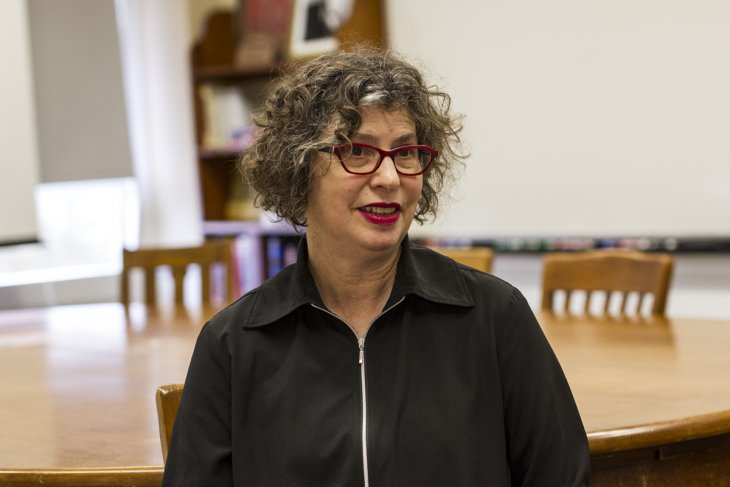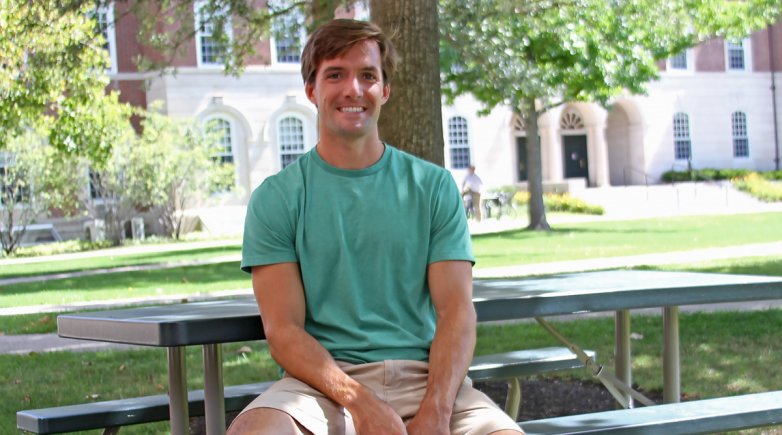Ellen Oliensis '77

“I love to communicate something of the addictive pleasures of interpretation.”
Seated at the superbly polished 16-seater Harkness table, Ellen Oliensis glances at students and faculty gathered in the Latin Study for her seminar on Ovid. This Berkeley professor of classics, author of several books including Freud’s Rome: Psychoanalysis and Latin Poetry, pauses briefly, a contrast to her usual fast pace, and asks, “How would you rewrite the Apollo and Daphne story to change the meaning to be more respectful to Apollo?”
After gathering their thoughts for a moment, the students start throwing out ideas: “Take down Cupid, not Apollo,” says a boy from the back of the room. “Have Daphne be the bad guy,” says a girl sitting across the table from Oliensis. “Involve Daphne’s father,” offers up another girl, seated near the window.
All week, 30 or so students have rushed to the Academy building for “Reading Ovid’s Daphne,” a series of lunchtime seminars with Oliensis, sandwiched between regularly scheduled classes. They grab food from a side table, throw down their knapsacks, take a seat at the table or in extra chairs arranged around the brightly lit room, and look expectantly at Oliensis, eager to discuss Ovid in depth.
“It is a pleasure and a kind of luxury,” Oliensis says of her Exeter residency, which allowed her to focus intensively on a single passage from Ovid. “I love to communicate something of the addictive pleasures of interpretation,” she says, with a nod to the Exonians she encountered, many of whom, she observes, have the literary bug already. “If I have managed to communicate the pleasure of discovery in reading to anyone, then it would feel good.”
Teaching came to Oliensis through the backdoor. After college, she did a stint as a middle school teacher, an experience she says “didn’t give me the sense that teaching was something I was going to love to do.” Living near Harvard, she sat in on a couple of classes, because she “really missed being in school and reading books in that particular kind of way.” She ultimately completed her doctorate in comparative literature there.
Oliensis, who by her own admission seeks to remain as incognita as possible, has not been back to Exeter in years, and she was curious. “It has been delightful,” she says of the visit, during which she gave the college-level Ovid seminar, which was open to all students and PEA employees, and a public evening lecture. She also visited a number of classical languages classrooms. “I love the collaborative dimension of these classes,” she says. “They’re relaxed, but serious.”
“It has been interesting just being in this space,” Oliensis says, referring not only to the Academy Building, but also to the campus at large. “The spaces are kind of invested — they retain something of the intensity of the experiences that I had in them.” She talks fondly of some of the teachers she had while a student here, most notably Mr. Coffin’s mini-lectures on Catullus, Mr. Wooley (“Classics 34 was a huge, amazing, incredible, intense, fabulous experience”), Mr. Rindfleisch (English) and Mr. Moore (“my wonderful French teacher who gave me a copy of A Room of One's Own — I still have it”).
Oliensis takes back to Berkeley more than revived memories. “Latin teachers struggle with engaging students when we’re doing translations around the room,” she explains. “You often just don’t really know what’s coming across or how things are processing. The Harkness system is meant to surmount that, because so much is about waiting and listening. ... There are some solutions here that I’m really interested in trying.”
—Nicole Pellaton

